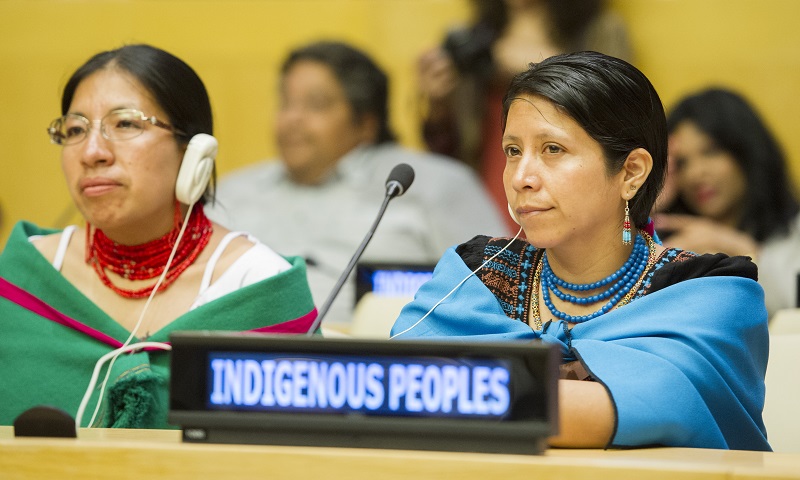
Giving indigenous peoples rights and control over their education is crucial for the 2030 Agenda for Sustainable Development and “leaving no one behind.” Indigenous Peoples’ Right to Education, particularly for indigenous youth, were the focus of the 2016 celebration of the International Day of the World’s Indigenous Peoples. A high-level segment of remarks and a panel featuring indigenous leaders, UN Representatives and comments from Member States were held on 9 August at the Economic and Social Council Chamber at United Nations Headquarters in New York.
The theme of this year’s celebration focused on the right of indigenous peoples to education which is protected under Article 14 of the UN Declaration of the Rights of Indigenous Peoples (UNDRIP). The document states that “Indigenous peoples have the right to establish and control their educational systems and institutions providing education in their own languages, in a manner appropriate to their cultural methods of teaching and learning.” Sustainable Development Goal (SDG) 4 also calls for equal access of education for vulnerable groups, including indigenous peoples.
Indigenous peoples need the right to education or they will be left behind. Indigenous youth around the world graduate from high school at rates far lower than the average non-indigenous population. Indigenous languages and cultures are regularly lost within the younger generation because of colonial-centred systems of education that neglect indigenous education. Education infrastructure is also inadequate for indigenous communities. Schools are sometimes built far from home for many children, impeding their learning and ability to acquire skills and a community life. UNDESA Assistant Secretary General Thomas Gass called for Member States to respond to indigenous rights and priorities in education, and to respect indigenous identities.
A short documentary Chile: Language-A Mirror of the Soul was also screened. It highlighted the struggles of Chile’s Mapuche indigenous peoples in maintaining their language and culture through education. Mapuche culture and language remained resilient throughout Chile’s colonial period until the 20th century when the state began to erect barriers to indigenous education. Today, young Mapuche are unable to speak their native languages and the small group of native speakers that do exist today are mostly over the age of 50. Education for indigenous youth is essential not only for the wellbeing of the Chile’s indigenous communities, but it is also key in the fight for their existence as indigenous communities.
The day’s celebrations were followed by a panel of indigenous educators and Member State representatives that spoke of the challenges of indigenous education in their countries and regions. Karla Jessen Williamson, a professor at the University of Saskatchewan in Canada spoke of the need for centres of education in Northern indigenous communities. Indigenous education needs to extend past high school and be included in university curricula. Indigenous education needs to be implemented at all levels and giving indigenous peoples control over what is taught and what languages are used to communicate ideas allows them to strive for higher learning, quality education and an improved quality of life.
To learn more about our work on indigenous peoples visit social.un.org/indigenous.
Source: UNDESA DSPD
 Welcome to the United Nations
Welcome to the United Nations